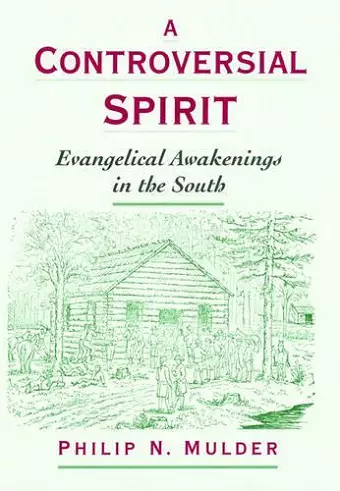A Controversial Spirit
Evangelical Awakenings in the South
Format:Hardback
Publisher:Oxford University Press Inc
Published:16th May '02
Currently unavailable, and unfortunately no date known when it will be back

This insightful exploration of southern evangelicalism reveals the intricate dynamics between denominations. A Controversial Spirit challenges previously held perceptions and highlights internal conflicts.
In A Controversial Spirit, Philip N. Mulder presents a fresh examination of the complex origins and nature of southern evangelicalism. Rather than focusing solely on the contrasts between evangelicals and non-evangelicals, Mulder delves into the internal dynamics that shaped these religious groups. By analyzing conversion narratives, worship practices, polity, and rituals, he crafts a nuanced portrait that reveals the intricate relationships among Presbyterians, Baptists, and Methodists during the formative years of the South from 1740 to 1820.
Mulder argues that while these denominations shared a common goal of saving souls, they held differing views on what constituted true religion and conversion. The Presbyterians and Baptists often prioritized their denominational concerns over the more freewheeling spirit of the awakenings, while the Methodists emerged as innovative advocates for the New Light. This distinction allowed them to break through the insularity of their counterparts, significantly altering the religious landscape of the emerging nation.
The American Revolution further intensified competition among these groups, as the established Anglican church was no longer a common adversary. This competition transformed the way these denominations interacted, pushing Presbyterians and Baptists to expand their boundaries. However, it also led to the Methodists compromising their original ecumenical ideals, as they began to emphasize their unique characteristics in order to distinguish themselves from others. Through this detailed analysis, A Controversial Spirit uncovers the deep-seated differences that have often been overlooked in the homogenization of religious history.
... a first-rate book that deepens our understanding of religious pluralism in America. * American Historical Review *
... this book helps to clarify our understanding of southern religion in the early republic. * Journal of the Early Republic *
One of this book's virtues is that it draws together a wide range of sources on groups that are usually dealt with separately. Mulder makes use of an impressive cross section of manuscripts and published records for each of the three churches he addresses. * Journal of the Early Republic *
Here is a book that significantly adds to our understanding of the internal dynamics of southern religion from the colonial Great Awakening to the pivotal post-Revolutionary years. * Journal of the Early Republic *
Mulder culls an impressive array of sources to tell his story in clear and graceful prose. The book is a delight to read and is one of the most fresh and nuanced studies we have of the theological origins of American Protestant evangelicalism. * The North Carolina Historical Review *
... brief and elegant. * The North Carolina Historical Review *
... bold and innovative. * The North Carolina Historical Review *
... an important and exciting book. * The North Carolina Historical Review *
A Controversial Spirit serves as a timely and poignant reminder to all historians to proceed with due caution when advancing generalizations about early southern evangelicals. * Journal of Presbyterian History *
ISBN: 9780195131635
Dimensions: 243mm x 167mm x 25mm
Weight: 522g
248 pages